 Petzlover
Petzlover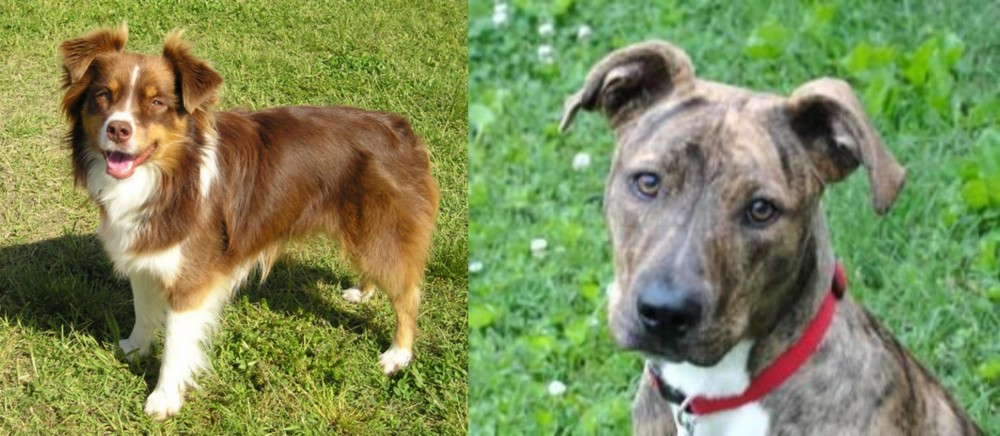 Both Miniature Australian Shepherd and Mountain Cur are originated from United States. Miniature Australian Shepherd may grow 20 cm / 7 inches shorter than Mountain Cur. Miniature Australian Shepherd may weigh 11 kg / 24 pounds lesser than Mountain Cur. Miniature Australian Shepherd may live 3 years less than Mountain Cur. Both Miniature Australian Shepherd and Mountain Cur has almost same litter size. Miniature Australian Shepherd requires Moderate Maintenance. But Mountain Cur requires Low Maintenance
Both Miniature Australian Shepherd and Mountain Cur are originated from United States. Miniature Australian Shepherd may grow 20 cm / 7 inches shorter than Mountain Cur. Miniature Australian Shepherd may weigh 11 kg / 24 pounds lesser than Mountain Cur. Miniature Australian Shepherd may live 3 years less than Mountain Cur. Both Miniature Australian Shepherd and Mountain Cur has almost same litter size. Miniature Australian Shepherd requires Moderate Maintenance. But Mountain Cur requires Low Maintenance
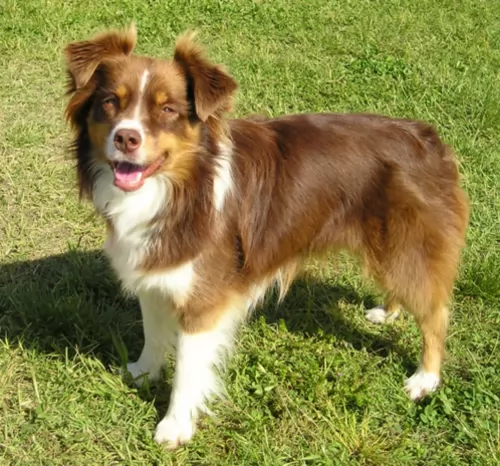 Unlike some miniaturized pure dog breeds, the Miniature Australian Shepherd is a breed of its own. The American Kennel Club and the United Kennel Club recognize that the miniature Australian Shepherd is the same as the miniature American Shepherd.
Unlike some miniaturized pure dog breeds, the Miniature Australian Shepherd is a breed of its own. The American Kennel Club and the United Kennel Club recognize that the miniature Australian Shepherd is the same as the miniature American Shepherd.
Certain breeding programs to develop the Miniature Australian Shepherd have been established and this dog is a small version of the Australian Shepherd. You can say that the Mini Australian Shepherd was developed in the 1960s and hails from the USA. American ranchers bred small Australian Shepherd dogs to create smaller replicas of the breed.
 From The United States in the hound group comes the Mountain Cur. This breed was developed especially to “tree” their prey and to trail other smaller game. They treed and bayed larger prey like the wild boar and bears in the mountains and they trailed the smaller ones like the raccoon and squirrel. There are many types of curs and this breed is just one. Curs can be water dogs, farm dogs, hunting dogs and guard dogs. However, they are not great family dogs because they were born to hunt.
From The United States in the hound group comes the Mountain Cur. This breed was developed especially to “tree” their prey and to trail other smaller game. They treed and bayed larger prey like the wild boar and bears in the mountains and they trailed the smaller ones like the raccoon and squirrel. There are many types of curs and this breed is just one. Curs can be water dogs, farm dogs, hunting dogs and guard dogs. However, they are not great family dogs because they were born to hunt.
The Mountain Cur comes out of Kentucky, Tennessee, Ohio and Virginia. The ancestors of the American Mountain Cur came with European settlers almost 200 years ago. They worked with the settlers to hunt for animals that would provide them with pelts and meat in order to survive on the frontier. The breed became rare when the descendants of the settlers moved to the factories after the second world war.
The breed was brought back by four ambitious men who saved the Mountain Cur. They form the Original Mountain Cur Breeder’s Association of OMCBA in 1956. But they argued over the standard and 2 of the 4 left to form their own association: The Stephen Stock Mountain Cur Association. By 1957 the Mountain Cur Breeder’s Association formed but it took until 1998 for the Mountain Cur to be registered with the United Kennel Club.
The Mountain Cur is a tough, courageous dog as are all the Curs. They are willing to face large and ferocious prey. They are fearless watch dogs, using their trait of being quiet on the hunt to their advantage. The Mountain Cur wants nothing more than making you happy. They have been known to corner bears and even bulls. Given the independence and intelligence of the Mountain Cur it is important that the human be the pack leader, or the Cur will assume the role. If angry the Cur will growl and bite, so being the pack leader is vital for humans.
The novel “Old Yeller” was written about a Mountain Cur – a yellow shorthaired dog with a bobbed tail and terrier blood. Like all Mountain Curs “Old Yeller” hunted and treed prey, fought a bear and held onto the nose of a charging bull. The Cur was the first American purebred dog. Other early lines come from the Appalachian Mountains and near them in southern states. Mixing hounds and terriers created this tough, courageous dog whose tenacity and grit are second to none. Today the Mountain Cur has been split into four distinct breeds: the Mountain Cur, The Mountain View Cur, the Stephens Stock, and the Treeing Tennessee Brindle.
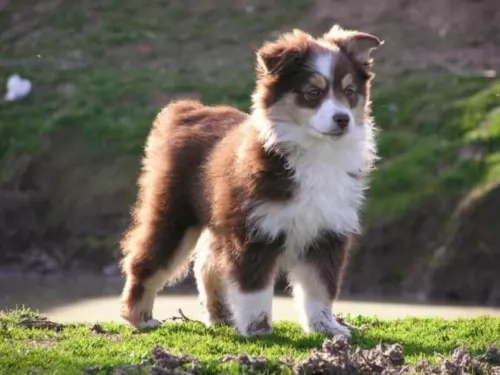 The Miniature Australian Shepherd’s coat is medium-length and is straight or wavy. It comes in a range of colors such as blue or red merle and red or black tricolor. There are white or tan markings as well. He is a small dog, standing at 33 - 46 cm in height and weighing 6 – 16kg.
The Miniature Australian Shepherd’s coat is medium-length and is straight or wavy. It comes in a range of colors such as blue or red merle and red or black tricolor. There are white or tan markings as well. He is a small dog, standing at 33 - 46 cm in height and weighing 6 – 16kg.
They have blue or brown eyes but some will even have one eye blue and the other brown. The ears are semi erect, semi floppy and the tail, while essentially left long and feathery, is sometimes docked.
Miniature Australian Shepherds are easygoing dogs who love being with their human families. They get on well with children in the home and are always willing to jump right in for a game.
They’re lively and agile and if its not games they’re busy with, they want to be on a walk. They’re loving and loyal and also eager to please, sensing what their owner wants.
They’re intelligent dogs too and easy to train so it is sure to go well with training and socialization, which is important for any dog. This training and socialization can actually help with problems a dog has such as being very nervous or being too active indoors. They become obedient and manageable wherever they are.
He is also willing to get on with other pets in the house. Just like the larger dog, the mini Australian Shepherd loves to be active and at work.
 Bred to be a hard working hunter and protector, the Mountain Cur is rugged and stocky. They are muscular with strong neck, wide head and expressive dark brown eyes. Some may have blue or green eyes, but they will be darker instead of light. They have a heavy muzzle, high set short ears and feet that are catlike, muscular and strong. The Cur has straight legs, deep chests and 50% are born with the tail bobbed.
Bred to be a hard working hunter and protector, the Mountain Cur is rugged and stocky. They are muscular with strong neck, wide head and expressive dark brown eyes. Some may have blue or green eyes, but they will be darker instead of light. They have a heavy muzzle, high set short ears and feet that are catlike, muscular and strong. The Cur has straight legs, deep chests and 50% are born with the tail bobbed.
Their coat is short and heavy. The colors could be yellow, red, blue, brindle, black and brindle, yellow with white points, dark brown and red.
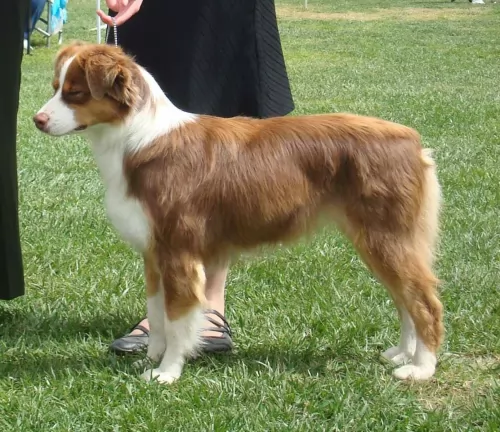 The wonderful friendly nature’s of these dogs make them excellent family pets, especially when they have been trained and socialized. They can live in the city or country but they will certainly require being exercised as they are an active breed, wanting to be busy with his human family.
The wonderful friendly nature’s of these dogs make them excellent family pets, especially when they have been trained and socialized. They can live in the city or country but they will certainly require being exercised as they are an active breed, wanting to be busy with his human family.
You can’t describe these dogs as low maintenance as they have long, thick hair that sheds and which will also need to be brushed regularly.
If you’re able to provide a good home for this beautiful, lively dog, then he will make you a splendid pet.
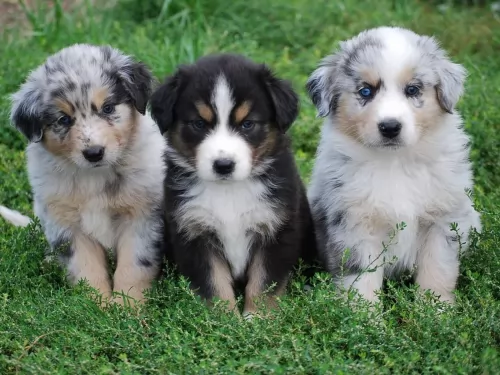 Your Miniature Australian Shepherd can enjoy good health if you make sure he has a nutritious diet, he is well exercised and he is happy and content because of the attention you give him. He can easily reach 13 years of age.
Your Miniature Australian Shepherd can enjoy good health if you make sure he has a nutritious diet, he is well exercised and he is happy and content because of the attention you give him. He can easily reach 13 years of age.
Also, say what you like, human beings constantly tampering with animals to produce certain looks has its drawbacks and can create health problems in dogs.
As a pure breed however, these dogs will be more susceptible to some common canine health problems such as hypothyroidism, patellar luxation, obesity, hip dysplasia, vision problems and cancer.
 There are a few health issues that the Mountain Cur is susceptible to. They include:
There are a few health issues that the Mountain Cur is susceptible to. They include:
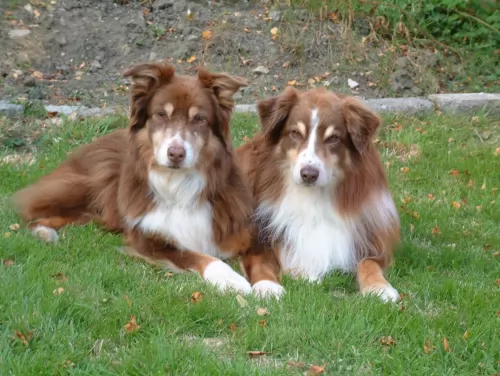 The mini Australian Shepherd has a long coat with seasonal shedding. You will need to give the coat a good brush twice a week to keep it untangled and to remove loose hair.
The mini Australian Shepherd has a long coat with seasonal shedding. You will need to give the coat a good brush twice a week to keep it untangled and to remove loose hair.
Other grooming for your pet will be to check his eyes and ears for infection, check for unusual lumps when you brush him and check for fleas and ticks. Keep his nails trimmed and brush his teeth 2 or 3 times a week to avoid plaque build up.
If you’re wondering how to keep your dog well groomed for the enhancement of this health, people such as your vet or professional groomers will do these grooming tasks for you.
Top quality commercially manufactured dog food packed with vitamins and minerals needs to be your choice if you're going to be using these dog foods. Avoid the cheaper brands that use lots of fillers, sugar, salt, colorants and preservatives.
Home-made food is a wonderful treat for a dog and delicious, nutritious and simple ingredients such as boiled chicken, brown rice or pasta and some cooked vegetables chopped up into his dry kibble from time to time will do him wonders.
Sometimes it will also be good to add in a little bit of raw meat too. Make sure there is a bowl of fresh, cool water available to your pet constantly.
 Mountain Cure puppies should eat four bowls of high quality dog food in four separate meals each day until 3 months old. From three months to six months feed them 3 times per day and from six months to a year just twice a day.
Mountain Cure puppies should eat four bowls of high quality dog food in four separate meals each day until 3 months old. From three months to six months feed them 3 times per day and from six months to a year just twice a day.
The adult Mountain Cur would eat 3 cups of high quality dog food in one or two meals per day. Don’t overfeed them as they have a tendency toward obesity.
Athleticism
This breed is an active dog and he needs to get plenty of exercise. He needs daily exercise – daily walks – and enjoys canine sports like barn hunt and agility. They do well in field trials.